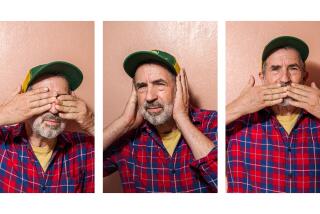Chimps Get TLC in Halfway House : Burundi: Center was founded by famous primate expert Jane Goodall. It treats problems much like those of abused children.
- Share via
BUJUMBURA, Burundi — Around the world, shelters give refuge and sorely needed love and care to abused, neglected and abandoned youngsters. The Halfway House in Bujumbura does the same for chimpanzees.
Jane Goodall, the renowned primate researcher, set up the center three years ago to rehabilitate chimps traumatized by mistreatment in captivity.
During a recent visit, little Uruhara cried out for his friend and caretaker. Elie Nukurikiye scooped the 5-year-old chimp into his arms and growled throatily.
Mimicking the grooming behavior of primates, the Burundian plucked at imaginary pests. Then he dropped Uruhara to the ground and they walked together. Uruhara howled in delight.
Uruhara, whose name means Bold in the Kirundi language, is a success story of the Jane Goodall Institute.
When he was rescued from a cage at a Bujumbura hotel, the tiny chimp was withdrawn, bald and scarred by burning cigarettes. After three years at the center, he is becoming himself again.
“Uruhara was a tiny baby when he came here. I took care of him. He knows me now. He trusts me,” Nukurikiye said.
Unlike some animal centers, the Halfway House does not try to return its charges to the wild. The institute feels they have been around humans so long that they cannot learn how to forage for food and defend themselves. They also have lost the natural caution that prevents chimps from wandering into villages where they might be in danger.
Goodall first came to Burundi in 1988 to give advice on protecting the remaining forests through wildlife conservation focusing on chimpanzees, an endangered species.
Just 100,000 chimps are left in the wilds of Central Africa. They are found from Sierra Leone in the west to Tanzania in the east. Only 400 wild chimps are thought to remain in Burundi.
While organizing the project, Goodall was appalled to learn that chimps were kept as pets by foreigners working in Burundi, often in dreadful conditions. She opened the Halfway House in an industrial area of Burundi’s capital in 1991.
Debby Cox, an Australian, oversees a staff of seven Burundians in caring for 19 chimps.
“Some chimps come to the Halfway House looking like malnourished children. They’re bald, their eyes bulge and their stomachs are swollen. It’s very saddening,” she said.
Captured chimps usually are permanently scarred because they have seen their mothers killed. “They freak out if they see someone with a gun,” Cox said.
They often have been kept in isolation, a garage or a cage, for long periods, so they no longer know how to socialize.
At the Halfway House, chimpanzees are gradually brought back to good physical health. The more difficult challenge is helping them recover from psychological trauma and teaching them to socialize.
The scene at the Halfway House is controlled chaos. The six adult chimps are kept in cages because their strength and troubled natures make them dangerous to humans. Five adolescent chimps are outside but on leashes to keep them from running away.
Until he was rescued by Goodall, Poco spent the first few years of his life in a cage suspended above a service station to attract customers.
Now he beckons visitors to his cage, smells their knees and elbows and offers a kiss. He likes to foot-wrestle with Cox. “He gives me full embraces through the bars, and with a small stick he cleans my fingernails for me,” she said.
Niyonkuru, whose name means Gift From God , had a brown rather than a black coat when he arrived. “He did not want to be touched; he did not want to be held. He didn’t interact at all,” Cox said.
Then one day Niyonkuru was startled and jumped into a caretaker’s arms. That was the beginning of his recovery, Cox said.
Not all do so well.
Akela, 6, was kept for years in a cage at a Lake Tanganyika hotel. When she is returned to her cage each night at the Halfway House, she rocks--a behavior often shown by abused or neglected children, Cox said.
The group hopes someday to give the chimps a better home in an animal sanctuary on Lake Tanganyika, south of Bujumbura in part of the Kigwena Forest Reserve.
More to Read
Sign up for Essential California
The most important California stories and recommendations in your inbox every morning.
You may occasionally receive promotional content from the Los Angeles Times.












